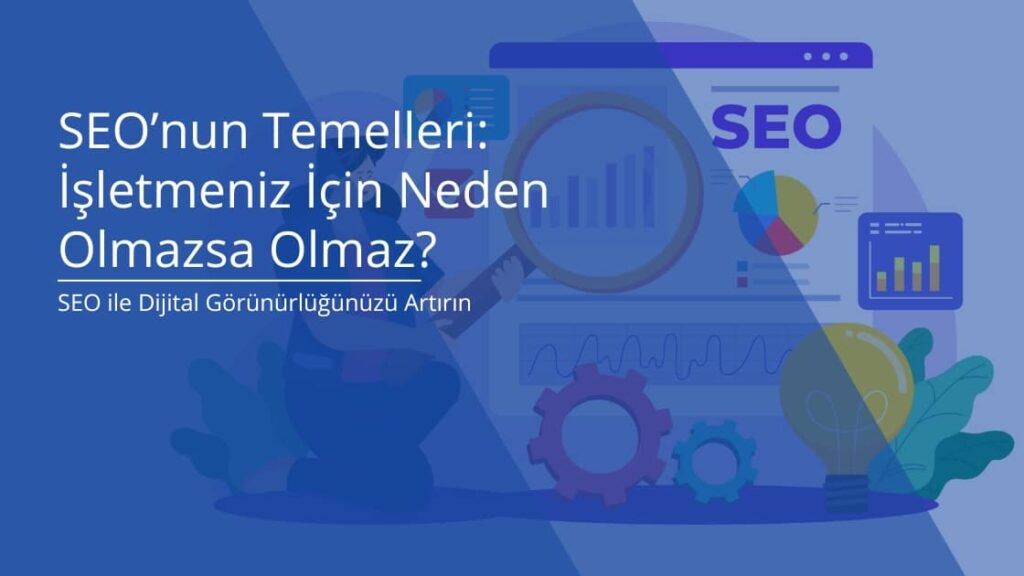Dijital dünyada var olmanın ve başarılı olmanın en önemli yollarından biri, arama motorlarında üst sıralarda yer almaktır. Arama motoru optimizasyonu (SEO), web sitenizin arama motorlarında daha iyi sıralamalar elde etmesini sağlayan bir dizi strateji ve tekniktir. Bu yazıda, SEO’nun ne olduğunu, nasıl çalıştığını ve işletmeniz için neden bu kadar önemli olduğunu detaylı bir şekilde ele alacağım.
SEO Nedir?
SEO, web sitenizin arama motoru sonuç sayfalarında (SERP) daha üst sıralarda yer almasını sağlamak için yapılan optimizasyon çalışmalarının bütünüdür. Arama motorları, kullanıcıların arama sorgularına en uygun ve kaliteli sonuçları sunmak için karmaşık algoritmalar kullanır. SEO, bu algoritmaların nasıl çalıştığını anlamak ve web sitenizi bu algoritmalara uygun hale getirmek için yapılan çalışmaları içerir.
SEO’nun temel amacı, organik (reklam olmayan) arama sonuçlarında daha görünür olmaktır. Bu, web sitenize daha fazla trafik çekmenize, marka bilinirliğinizi artırmanıza, potansiyel müşterilere ulaşmanıza ve aynı zamansa satışlarınızı arttırmaya yardımcı olur. SEO’nun üç ana bileşeni vardır: Teknik SEO, Site içi SEO ve Site dışı SEO.
Teknik SEO
Teknik SEO, web sitenizin teknik altyapısını optimize ederek arama motorlarının sitenizi daha iyi taramasını ve dizine eklemesini sağlar. Teknik SEO’nun temel unsurları üç başlık altında sıralayacağım.
1. Site Hızı
Web sitenizin yüklenme hızı, kullanıcı deneyimi ve arama motoru sıralamaları için kritik öneme sahiptir. Hızlı yüklenen bir site, kullanıcıların sitede daha uzun süre kalmasını sağlar ve arama motorları tarafından daha olumlu değerlendirilir. Site hızını hızlandırmak için resimlerin optimize edilmesi, gereksiz eklentilerin kaldırılması ve web sunucusu olarak hızlı bir hosting servisi kullanılması gibi önlemler alınabilir.
Web sitenizin hızını artırmak için ayrıca, tarayıcı önbellek ve sıkıştırma tekniklerini kullanabilirsiniz. Tarayıcı önbelleği, kullanıcıların sitenizi tekrar ziyaret ettiklerinde sayfaların daha hızlı yüklenmesini sağlar. Sıkıştırma teknikleri ise, web sayfalarınızın boyutunu küçülterek daha hızlı yüklenmelerine yardımcı olur. Tüm bu teknikler, kullanıcı deneyimini iyileştirir ve arama motorları tarafından sitenizin daha iyi değerlendirilmesini sağlar.
2. Mobil Uyumluluk
Mobil cihazların bir günün neredeyse tamamında elimizden düşmediğini düşündüğümüzde ve istatistiklere baktığımızda mobil cihazlardan yapılan aramalar, toplam aramaların büyük bir kısmını oluşturduğunu biliyoruz. Bu nedenle, web sitenizin mobil uyumlu olması, hem kullanıcı deneyimi hem de SEO başarısı açısından önemlidir. Responsive (mobile uyumlu) tasarım kullanarak sitenizin tüm cihazlarda düzgün görüntülenmesini sağlayabilirsiniz.
Mobil uyumlu bir web sitesi, kullanıcıların farklı ekran çözünürlüğündeki cihazları kullansa dahi web sitesinde sorunsuzca gezinmesini sağlar. Mobil kullanıcılar için optimize edilmiş bir site, daha düşük hemen çıkma oranlarına (bounce rate) ve daha yüksek kullanıcı etkileşimi almanızın yolunu açar. Google, mobil uyumlu siteleri ödüllendirir ve mobil arama sonuçlarında daha üst sıralarda yer almalarını sağlar. Bu nedenle, mobil uyumluluk, SEO stratejinizin önemli bir parçası olmalıdır.
3. Site Haritası ve Robots.txt
Site haritası (XML sitemap), arama motorlarına sitenizin yapısını ve içeriğini daha iyi anlamalarına yardımcı olur. Robots.txt dosyası ise arama motoru botlarına hangi sayfaların taranması gerektiğini belirtir. Bu iki dosyanın doğru yapılandırılması, arama motorlarının sitenizi daha verimli taramasını sağlar.
Site haritası, arama motorlarına tüm sayfalarınızı göstermek için kullanılırken, robots.txt dosyası, belirli sayfaların taranmasını engelleyebilir. Bu, özellikle hassas bilgilerin korunması veya düşük öncelikli sayfaların taranmasının önlenmesi için önemlidir. Her iki dosyanın da doğru yapılandırılması, arama motorlarının sitenizi daha hızlı ve verimli bir şekilde dizine eklemesine yardımcı olur.
Site İçi SEO
Site içi (On-page) SEO, web sitenizdeki içerik ve HTML yapısını optimize ederek arama motorlarına daha iyi sinyaller gönderir. Site içi SEO’nun temel unsurlarını aşağıdaki gibi sıralayabiliriz. Fakat unutmayın bu yalnızca temel başlıkları kapsamaktadır. Site içinde yapılması gereken yüzlerce detaylı çalışmalar yürütülmeli. Daha detaylı klavuzlar için blogumuzu takip etmeyi ve e-posta bültenimize kaydolmayı unutmayın.
1. Anahtar Kelime Araştırması
Anahtar kelime araştırması, hedef kitlenizin arama yaptığı terimleri belirlemek ve bu terimleri içeriğinizde kullanmak için yapılan çalışmalardır. İyi bir anahtar kelime araştırması, doğru anahtar kelimeleri belirlemenize ve bu kelimeleri stratejik olarak sayfalarınıza yerleştirmenize yardımcı olur. Anahtar kelimeleri başlıklar, meta açıklamalar, URL’ler ve içerikte doğal bir şekilde kullanmak önemlidir.
Anahtar kelimeleri belirlerken, uzun kuyruklu (long-tail) anahtar kelimelere de odaklanmak önemlidir. Bu tür anahtar kelimeler, daha spesifik arama sorgularını hedefler ve genellikle daha düşük rekabete sahiptir. Ayrıca, kullanıcı niyetini anlamak ve içeriklerinizi bu niyete göre şekillendirmek, anahtar kelime stratejinizin başarısını artırır. Anahtar kelimeleri doğal bir şekilde kullanmak, hem kullanıcı deneyimini iyileştirir hem de arama motorlarının içeriğinizi daha iyi anlamasına yardımcı olur.
2. Başlık Etiketleri ve Meta Açıklamalar
Başlık etiketleri (H1, H2, H3 vb.), içeriğinizin yapısını ve hiyerarşisini belirler. H1 etiketi, sayfanın ana başlığını belirtirken, H2 ve H3 etiketleri alt başlıkları belirtir. Başlık etiketlerinin doğru kullanımı, arama motorlarının içeriğinizi daha iyi anlamasına yardımcı olur. Meta açıklamalar ise arama sonuçlarında görünen kısa özetlerdir ve kullanıcıları sitenizi tıklamaya teşvik eder. Meta açıklamaların dikkat çekici ve anahtar kelime odaklı olması önemlidir.
Başlık etiketleri, kullanıcıların içeriğinizde kolayca gezinmelerini sağlar ve arama motorlarına içeriğinizin ana konularını belirtir. Başlık etiketlerini optimize etmek, hem kullanıcı deneyimini iyileştirir hem de arama motorlarının içeriğinizi daha iyi anlamasına yardımcı olur. Meta açıklamalar ise, kullanıcıların arama sonuçlarında sitenizi tıklamalarını teşvik eder. İyi yazılmış bir meta açıklama, tıklama oranlarını artırabilir ve sitenize daha fazla trafik çekebilir.
3. İçerik Kalitesi
İçerik, SEO’nun en önemli unsurlarından biridir. Kaliteli, özgün ve değerli içerikler oluşturmak, kullanıcıların sitenizde daha uzun süre kalmasını sağlar ve arama motorları tarafından ödüllendirilir. İçeriğinizin hedef kitlenizin ihtiyaçlarını karşılaması ve onların sorularına yanıt vermesi önemlidir. Ayrıca, içerikte görseller, videolar ve infografikler gibi medya öğeleri kullanmak da kullanıcı deneyimini artırır.
Düzenli olarak güncellenen ve taze içerikler yayınlamak, arama motorlarının sitenizi daha sık taramasını sağlayacaktır ve daha iyi sıra almanızı sağlayabilir. Uzun biçimli içerikler, genellikle daha fazla bilgi sağlar ve kullanıcılar tarafından daha değerli bulunur. İçeriğinizi optimize ederken, anahtar kelimeleri doğal bir şekilde kullanmak, iç bağlantılar eklemek ve kullanıcıların kolayca paylaşabileceği içerikler oluşturmak önemlidir. Kaliteli içerik, kullanıcıların sitenize geri dönmelerini sağlar ve sadık bir takipçi kitlesi oluşturmanıza yardımcı olur.
Site Dışı SEO
Site dışı SEO, web sitenizin dışında yapılan çalışmalar ile sitenizin otoritesini artırmayı amaçlar. Site dışı SEO’nun temel unsurlarını şimdi temel olarak ele alalım.
1. Backlinkler
Backlinkler, diğer web sitelerinden sizin sitenize verilen bağlantılardır. Kaliteli ve otoriter sitelerden alınan backlinkler, arama motorlarına sitenizin güvenilir ve değerli olduğunu gösterir. Backlink oluşturma stratejileri arasında misafir blog yazarlığı, içerik paylaşımı ve sosyal medya etkileşimleri yer alır. Ancak, düşük kaliteli veya spam niteliğindeki backlinkler sitenize zarar verebilir, bu nedenle backlinklerin kalitesine dikkat etmek önemlidir.
Backlinkler, arama motorlarının sitenizin otoritesini değerlendirmesinde önemli bir rol oynar. Kaliteli backlinkler, sitenizin güvenilirliğini artırır ve arama motorlarında daha üst sıralarda yer almanızı sağlar. Backlink stratejinizi oluştururken, doğal ve organik bağlantılar oluşturmaya odaklanmalısınız. Ayrıca, sektördeki diğer otoriter sitelerle işbirliği yaparak, backlink profilinizi güçlendirebilirsiniz.
2. Sosyal Medya Paylaşımları
Sosyal medya, içeriklerinizin daha geniş kitlelere ulaşmasını sağlar ve sitenize trafik çeker. Sosyal medya paylaşımları, dolaylı olarak SEO’ya katkıda bulunur. İçeriğinizin sosyal medya platformlarında paylaşılması, marka bilinirliğinizi artırır ve potansiyel backlink fırsatları yaratır. Sosyal medya stratejinizde düzenli ve etkileşim odaklı paylaşımlar yaparak, kitlenizle daha güçlü bir bağ kurabilirsiniz.
Sosyal medya platformlarında aktif olmak, markanızın görünürlüğünü artırır ve kullanıcılarla etkileşimi güçlendirir. Sosyal medya paylaşımlarınızda, hedef kitlenizin ilgisini çekecek içerikler oluşturmaya özen gösterin. Ayrıca, kullanıcıların içeriklerinizi paylaşmalarını teşvik edecek kampanyalar ve etkinlikler düzenleyebilirsiniz. Faydalı/ilgi çekici içerikler paylaşılarak içeriklerinizin viral olması halinde organik trafik ve backlinkler elde etmenize yardımcı olabilir.
3. Yerel SEO
Yerel SEO, belirli bir coğrafi bölgedeki kullanıcıları hedefleyen optimizasyon çalışmalarını içerir. Google My Business gibi yerel listeleme hizmetlerine kaydolmak, işletmenizin yerel arama sonuçlarında görünürlüğünü artırır. Ayrıca, yerel anahtar kelimeleri içeriğinizde ve meta etiketlerinizde kullanmak, yerel SEO çalışmalarınızı destekler.
Yerel SEO, özellikle fiziksel bir mağaza veya hizmet sunan işletmeler için önemlidir. Yerel arama sonuçlarında üst sıralarda yer almak, bölgenizdeki potansiyel müşterilere ulaşmanıza yardımcı olur. Google My Business profilinizi optimize ederek, işletmenizin çalışma saatleri, adresi ve müşteri yorumları gibi bilgileri güncel tutabilirsiniz. Ayrıca, yerel etkinlikler ve topluluklarla işbirliği yaparak, yerel SEO stratejinizi güçlendirebilirsiniz.
SEO’nun İşletmeniz İçin Önemi
SEO, işletmenizin çevrimiçi varlığını güçlendirmek ve hedef kitlenize ulaşmak için kritik bir rol oynar.
SEO, organik arama sonuçlarında daha üst sıralarda yer almanızı sağlar, bu da daha fazla trafik ve potansiyel müşteri demektir. Arama motorları, kullanıcıların en çok güvendiği bilgi kaynaklarıdır ve üst sıralarda yer almak, işletmenizin güvenilirliğini artırır. Ayrıca, SEO, uzun vadeli bir yatırım olarak değerlendirilir; optimize edilmiş bir site, sürekli olarak organik trafik çekmeye devam eder.
SEO, aynı zamanda kullanıcı deneyimini iyileştirir. İyi yapılandırılmış ve optimize edilmiş bir web sitesi, kullanıcıların aradıkları bilgilere kolayca ulaşmalarını sağlar. Kullanıcı dostu bir site, ziyaretçilerin sitede daha uzun süre kalmasını ve daha fazla etkileşimde bulunmasını teşvik eder. Bu da, arama motorları tarafından olumlu değerlendirilir ve sıralamalarınızı iyileştirir.
Son olarak, SEO, rekabet avantajı sağlar. Rakiplerinizin de SEO stratejileri uyguladığını düşünürsek, sizin de bu alanda güçlü olmanız gerekmektedir. İyi bir SEO stratejisi, rakiplerinizin önüne geçmenizi ve pazarda daha güçlü bir konum elde etmenizi sağlar. SEO, sürekli olarak güncellenen bir alan olduğu için, trendleri ve algoritma değişikliklerini takip etmek ve stratejinizi buna göre uyarlamak önemlidir.




